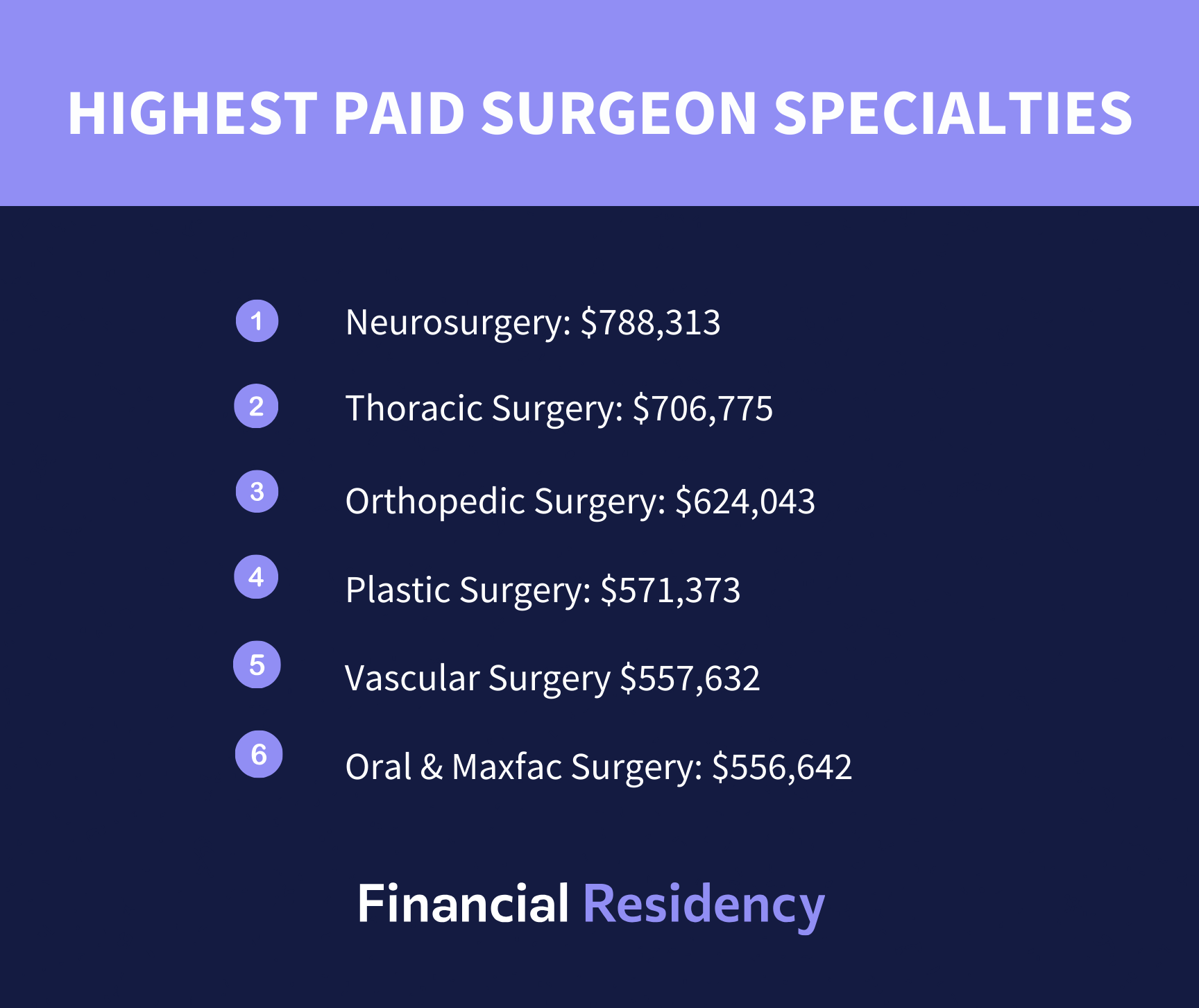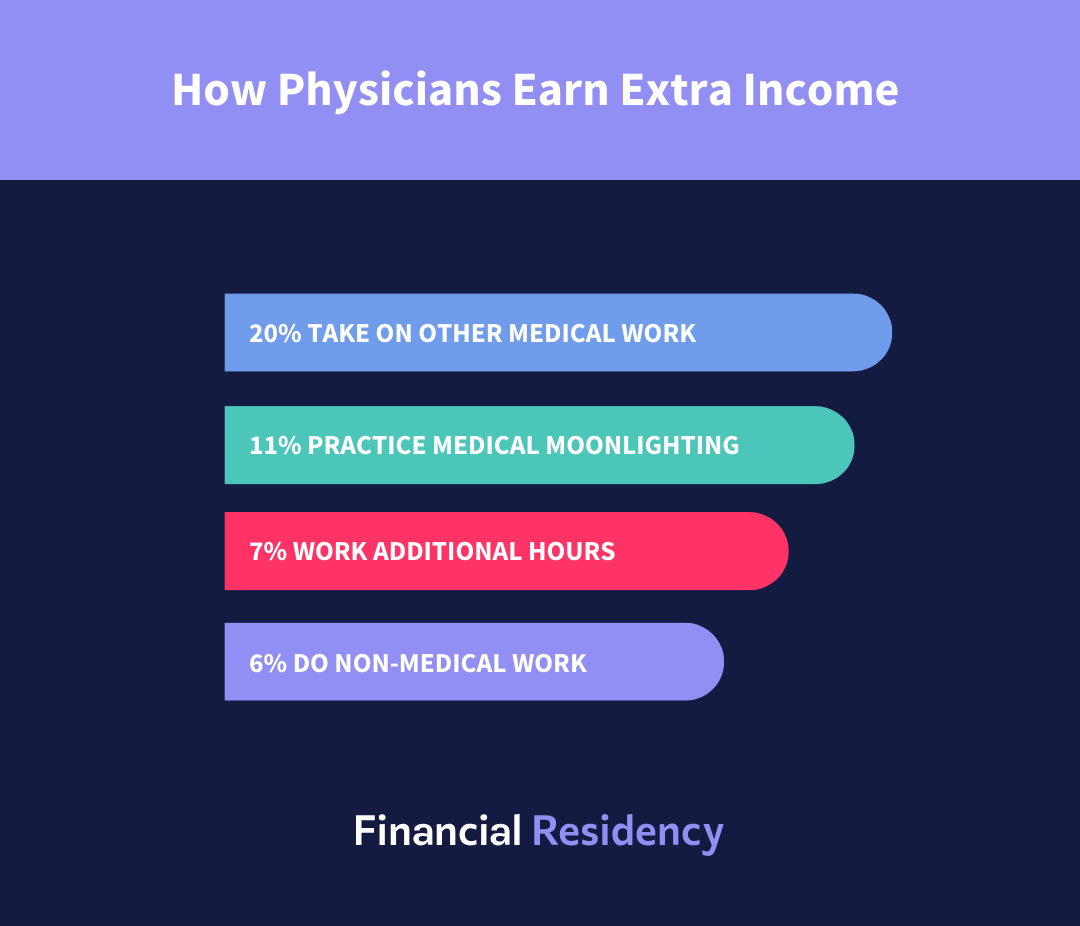It’s widely contended that surgeons make a great living and hold fulfilling careers as medical experts. And while both of these points can be true, it is quite a challenging career. Surgeon jobs are physically demanding, stressful jobs with high rates of burnout.
Yet the majority of surgeons (52%) do feel fairly compensated. And while wages have remained stagnant for most Americans, surgeons’ salaries have risen by 30% from 2015 to 2022. And while pay did dip for some physicians during the COVID-19 pandemic, surgeons remained largely immune to those wage shocks.
So, what’s the average salary for a surgery in the U.S.? And which surgeons make the most money? There’s no one-size-fits-all answer. Read on to find the average surgeon salary based on specialization, experience, local market, and myriad other factors.
How Much Do Surgeons Make on Average?
The national average salary of a general surgeon in the U.S. is $451,489 according to a 2023 study by Doximity, or $402,000 in a similar Medscape physician compensation report conducted the same year.
Plastic surgeons and orthopedic surgeons were found to be the highest-paying specialties in Medscape’s report, whereas Doximity reports that neurosurgeons and thoracic surgeons have top wages.
While there is some variance with these study results, overall they do show general alignment.
Read more about the methodology and resources for Doximity and Medscape.
Highest Paid Surgeon Specialties
Salary findings in the Doximity report outline the highest-paying salary ranges by specialty.
Specialization: Average Annual Salary
- Neurosurgery: $788,313
- Thoracic Surgery: $706,775
- Orthopedic Surgery: $624,043
- Plastic Surgery: $571,373
- Vascular Surgery: $557,632
- Oral & Maxillofacial Surgery: $556,642

Factors that Impact a Surgeon’s Salary
Numerous factors can impact a surgeon’s salary.
Specialty
Area of specialization is the number one factor impacting how much a surgeon makes. Neurosurgeons average over $340,000 more in average earnings than general surgeons or colorectal surgeons — the gap alone exceeds the average salary earnings of over 20 different M.D. specializations.
Years of Experience
Years of practice are a major contributing factor to salary. Resident surgeons average an annual salary of $64,200, with slight increases after each year of residency completed.
Directly after residency, an entry-level general surgeon earns an annual salary of around $306,000 a year for the first five years to 10, after which earnings begin to rise rapidly. With each subsequent five to 10 years of experience, surgeons can see a material increase in earnings.
Employment Setting
Workplace setting is a major driver of physician earnings.
Doximity examined salaries by clinical settings, looking at reported earnings for both surgical and non-surgical physicians and reported the following breakdown.
Employment Setting | Average Annual Compensation:
- Single Specialty Group: $438,959
- Solo Practice: $428,112
- Multi-Specialty Group: $421,159
- Health System / IDN / ACO: $400,207
- Hospital: $398,954
- Industry / Pharmaceutical: $392,534
- Health Maintenance Org.: $387,393
- Academic: $347,013
- Government: $269,189
- Urgent Care Center / Chain: $264,727
Although these figures do not exclusively report on surgeons’ earnings, from this data it’s reasonable to extrapolate that surgeons who work in single specialty groups or solo practices will earn significantly more than peers working for academic or government agencies.
Gender
There is a significant pay gap in the earnings of male versus female surgeons. In 2022, the average male surgeon earned 26% more than female peers — even when controlling for specialty, location, and total years of on-the-job experience.
While the 26% gap is a slight improvement from salary reports of 2021 — which indicated a 28% pay differential — the lower 26% figure still translates into $110,000 in total lost yearly income.
An earlier 2020 analysis, looking at physician data from 2014-2019, estimated that over the course of an entire career, male physicians will earn over $2 million more than their female counterparts.
These striking figures further underscore the need for gender pay transparency in all workplaces, including professional healthcare.
In examining the pay gap by medical specialty, here are the fields of medicine with the largest and smallest gender pay gaps.
Highest
| Field | Men Salary | Women Salary | Gap $ | Gap % |
| Oral & Maxillofacial Surgery | $568,789 | $385,687 | $183,102 | 47% |
| Pediatric Pulmonology | $282,272 | $227,958 | $54,314 | 24% |
| Allergy & Immunology | $329,634 | $268,938 | $60,696 | 23% |
| Urology | $515,850 | $424,733 | $91,117 | 21% |
| Ophthalmology | $468,515 | $386, 295 | $82,220 | 21% |
Lowest
| Field | Men Salary | Women Salary | Gap $ | Gap % |
| Nuclear Medicine | $394,231 | $382,431 | $11,800 | 3% |
| Pediatric Cardiology | $334,384 | $303,622 | $30,762 | 10% |
| Hematology | $358,736 | $320,938 | $37,798 | 12% |
| Internal Medicine / Pediatrics | $283,034 | $253,019 | $30,015 | 12% |
| Pediatric Gastroenterology | $293,771 | $254,135 | $39,636 | 16% |
Source: 2023 Doximity Physician Compensation Report
There is a gendered salary disparity in every field of medicine, including those not listed in the chart. The practice of nuclear medicine comes closest to parity with a 3% earning gap: Every other area of medicine has a more significant wage imbalance between men and women.
Race and Ethnicity
While not as pronounced as the salary gap between men and women, there’s also racial income disparity.
Caucasian or White physicians and Asian physicians significantly outearn their African-American or Black peers.
Here’s the breakout of annual physician compensation by racial-ethnic group:
RACIAL AND ETHNIC GROUP | AVERAGE SALARY
- Caucasian or White: $358,000
- Asian: $351,000
- Latinx or Hispanic: $338,000
- African-American or Black: $311,000
Source: Medscape Physician Compensation Report 2023
White doctors earn an average of 15% more ($47,000) than Black doctors.
These figures do not control for gender inequity or years of experience, and White doctors are more likely to be male (64%) than Black doctors (36%). Additionally, white doctors are more likely to be 45 years or older (74%) than Black doctors (67%).
Organizational Hiring Structure
Along with gender, the hiring structure of a surgeon’s workplace has a major impact on their total earnings.
In the 2023 Medscape study, Dr. Theresa Rohr-Kirchgraber, MD, president of the American Medical Women Association, addressed some key salary discrepancies.
“Due to efforts by many, some institutions and healthcare organizations have reviewed their salary lines and recognized the discrepancies not only between the sexes but also between new hires, which can be offered significantly more [pay] than those more senior physicians who have been working there for years under a different pay structure.”
Newer hires are more likely to be hired with a lower average base salary and a bonus structure.
Mike Belkin, vice president of physician recruitment firm Merritt Hawkins, says that compared to past years, “We’re not seeing many employers go to a fixed salary. There can be different types of incentive plans, but we still see the incentive bonus as a pretty important piece to physicians.”
Pay Structure and Bonus Plans
Annual bonuses — and long hours — make up a large component of a doctor’s total compensation. According to the Medscape study, 57% of all medical specialties said they are working harder and longer hours to earn this additional incentive pay.
This added compensation can be as high as $134,000. Here’s a snapshot of the average incentive bonus among 11 different specialties.
SPECIALTY | BONUS PAY
- Orthopedics: $134,000
- Cardiology: $88,000
- Radiology: $80,000
- General Surgery: $75,000
- Anesthesiology: $68,000
- Obstetrics & Gynecology: $57,000
- Family Medicine: $34,000
- Internal Medicine: $33,000
- Pediatrics: $31,000
Source: Medscape Physician Compensation Report 2023
The additional bonus pay is in addition to other primary compensation in the form of:
- Base salary dependent on regional market, specialty, and years of experience.
- Hourly compensation, common in urgent cares, locum tenens, or for on-call work.
- Value or performance-based pay based on the volume of service a doctor provides (measured as RVUs or Relative Value Units), or based on performance metrics including patient outcomes, episodes-of-care, patient satisfaction, and meeting specific clinical targets.
- Fee-for-service which is volume-based and not value-based, and tied to key performance metrics. With this model, physicians are compensated for office visits, tests, specific procedures, or other services.
- Capitation or a fixed fee per patient for a period of time, regardless of how many services a patient receives.
- Concierge practice with physicians compensated through direct patients from patients rather than through traditional insurance.
Market Demand
Location is another major component impacting total physician earnings. It’s not just large cities that have the highest average doctor compensation.
METRO AREA | AVERAGE YEARLY COMPENSATION
- Charlotte, NC: $430,890
- Louis, MO: $426,370
- Oklahoma City, OK: $425,096
- San Jose, CA: $148,600
- Minneapolis-St. Paul, MN: $411,677
- Sacramento, CA: $411,257
- Phoenix, AZ: $409,185
- Indianapolis, IN: $408,185
- Salt Lake City, UT: $408,044
- Atlanta, GA: $407,683
Source: 2023 Doximity Physician Compensation Report
Inversely, these are the metro areas with the lowest average compensation for doctors.
METRO AREA | AVERAGE COMPENSATION
- Washington, D.C.: $342,139
- Baltimore, MD: $346,260
- Boston, MA: $347,553
- San Antonio, TX: $347,692
- Raleigh, NC: $351,732
- Providence, RI: $354,342
- Virginia Beach, VA: $354,587
- Denver, CO: $357,010
- Philadelphia, PA: $358,443
- Birmingham, AL: $361,483
Source: 2023 Doximity Physician Compensation Report
Areas of the country with the highest cost of living often do not offer the highest physician compensation; supply and demand do not correlate.
When adjusting for local market conditions, physicians in California, New York City, and the nation’s most densely populated areas have the lowest compensation.
Taking into account local cost of living, doctors in these 10 metro areas are the lowest paid in the country:
- Washington, D.C.
- Boston, MA
- Seattle, WA
- Denver, CO
- Baltimore MD
- San Francisco, CA
- New York, NY
- San Diego, CA
- Portland, OR
- Providence, RI
Source: 2023 Doximity Physician Compensation Report
Inversely, doctors in Oklahoma, City, OK, Charlotte, NC, St. Louis, MO, and Louisville, KY come out on top when it comes to high compensation and low cost of living.
Outside Compensation
In addition to their regular, full-time work, many doctors have side hustles too.
The Medscape wage study found that 38% of physicians take on extra work to supplement their regular salary or hourly wages.
- 20% Take on Other Medical Related Work
- 11% Practice Medical Moonlighting
- 7% Work Additional Hours at Primary Job
- 6% Complete Non-Medical-Related Work
- 62% Do Not Take on Any Work in Addition to Primary Job
Respondents were able to select more than one option.

Of physicians who do not take on any additional work, this may be due to a non-compete in place. Nearly 62% of doctors in the Doximity study said they have a current non-compete clause that prohibits them from seeking external sources of income.
With the demand rising for per locum tenens, physicians, who fill in for other doctors during their absence, the Federal Trade Commission (FTC) may step in to ban these non-compete employment stipulations. Eight-seven percent of doctors are in favor of this FTC intervention.
Even physicians without an outright ban on side-gig work may benefit here, many state that their job’s contractual language is vague about any pursuit of outside earning opportunities.
How to Increase Your Salary as a Surgeon
- Negotiate fair pay upfront. Research other job openings with listed salaries and review salary data by metro area and specialty. Ask for a signing bonus upfront.
- Ask for a clear job description upfront. Surgeons might not be able to negotiate a higher salary or a large signing bonus, but you should negotiate any language that is intentionally ambiguous or outright unfair.
- Ask for a raise. If you find out your salary is at the 25th percentile but you feel your skills or experience place you at the 75th to 90th percentile, you have a solid case to ask for more money and renegotiate a contract.
- Medical staffing firms. Work with a staffing agency that specializes in placing surgeons, doctors, and other healthcare professionals at hospitals and medical centers. They can help you price and leverage your worth.
- Solo practice. One of the most common ways to increase annual income is to open your own solo medical practice.
- Hire assistants. If you own a solo or group practice, consider hiring physician assistants (PAs) and nurse practitioners (NPs) to manage simpler medical tasks so you can focus on surgical procedures.
- Develop a subspecialty. Learn a new procedure or develop a subspecialty. If you’re one of the only surgeons in the area with this niche skill, customers will flock to you.
- Capitalize on bonuses. This can add an additional $50K to $100K a year or more in added compensation.
- Get certifications. Board-certified surgeons can earn more money because it allows for additional specializations, increases credibility (patient perspective), and enhances your negotiation leverage. Some hospitals may require board certification for hospital privileging.
- Work locum tenens. Surgeons can find locum tenens work on job boards like LocumTenems.com. This includes general surgery work as well as more specialized areas like neurosurgery.
- You may love living in Los Angeles, but adjusting for the cost of living, you could make more money if you were willing to move to Nebraska, Kansas, or Wisconsin.
- Purchase real estate. There are physicians who buy investment or rental properties as a sideline to augment their yearly income. There’s generally no employer conflict of interest with doing so, and surgeons can qualify for specialty doctor financing for home loans.
These pointers can help you more effectively negotiate employment terms, as well as better evaluate job descriptions on DocCafe, ZipRecruiter, Doximity, and other job boards.




